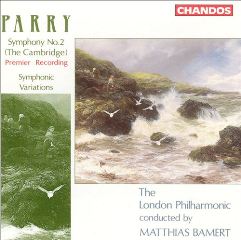Parry – Symphonie No.2 & Symphonic Variations (1991)
Parry – Symphonie No.2 & Symphonic Variations (1991)

Symphony No. 2 in F major 'The Cambridge' 37:46 1 I Andante sostenuto - Allegro moderato 11:48 2 II Scherzo: Molto vivace - Poco piů mosso - Presto 7:21 3 III Andante 8:07 4 IV Allegro vivace 10:23 5 Symphonic Variations (1897) 14:04 London Philharmonic Orchestra Matthias Bamert – conductor
"Das Land ohne Musik," was Mendelssohn's grim verdict on English musical culture ("the land without music"). He was right, at the time. Aside from Purcell -- who predates Vivaldi, in any event -- those musicians most closely associated with England, i.e., Handel, Haydn, Clementi, Cramer, Salomon, Pleyel, were emigres, usually from Austria or Germany.
However, the latter part of the 19th century saw the flowering of native English composers. While modern taste seems to have given the laurels to the mincing Sir Arthur Sullivan (and his pale "Savoy Operas") or the lush Gothic Romanticism of Elgar, the truth is these two were but tips of a decently-sized iceberg. Names like Parry, Stanford, Sterndale Bennett, and Attwood have become footnotes in musical encyclopedias. There may now be a bit of revival (courtesy of adventurous labels like Naxos, or Hyperion, whose approach tends towards chauvinism in favor of British composers).
Parry's symphonic talent is on full display in this Naxos offering, particularly his knack for writing punchy little cells with strong accents which are particularly ripe for symphonic argument. In addition, their compactness allows for transmogrification back and forth between melody and accompaniment. While the technique goes back to Haydn, Beethoven is recognized as its avatar. The main themes of Symphony No. 2's scherzo and of the "Overture to an Unwritten Tragedy" are examples of this.
There is something Schumannesque, as well, in Parry's orchestral sound, in its richness and brightness. At times, as well, Parry's massive slabs of brass and strings have a Nordic or Russian bulk to them, like Sibelius or Tschaikovsky. The playing on this disc is probably not the best (I detected some sour horn-intonation here and there) but this is a small price to pay for such a welcome recovery from that lost or overlooked portion of symphonic literature. This is strongly recommended for fans of symphonic music of the old, better stamp (i.e., Beethoven, Sibelius). ---Joseph Barbarie, amazon.com
download: uploaded anonfiles mega 4shared mixturecloud yandex mediafire ziddu








